J.P.Marín Arrese | The Bank of England will provide direct cash to cover public expenses. Under the Ways and Means Facility, it already offers short-term liquidity to the Treasury. But, from now on, it will finance all budgetary commitments monetising the massive deficit the coronavirus crisis will bring about. Governor Andrew Bailey openly rejected this step a few days ago. Now, faced with the appalling evidence that a sharp increase in spending coupled with plummeting tax revenues will lead to substantial public imbalances, he has changed his mind.
Buying sovereign bonds stands as a less unorthodox way of tackling the problem. Yet, colossal public tapering on the capital markets may lead to unduly tightened borrowing terms for private firms struggling to cope with liquidity shortages. Direct financing of the budget prevents such a worrying scenario.
Many observers point to the dangers such a move could entail, should it become permanent practice. The expansion in primary money could lead to inflationary pressures, ultimately leading to the need to raise interest rates. Yet, the current demand and offer slump provides little scope for price hikes. Let’s face it. Any liquidity glut right now, will not put stability into question.
The Bank of England’s move seems fully warranted, as the pandemic’s side effects will severely hit public finances. Alleviating the drag impact on borrowing will help the economy to cope with the current backlash. No one expects the ECB to take such a bold step; its cautious policy is in stark contrast with the expeditious way in which Anglo-Saxons are tackling the crisis.





